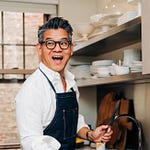This week on Five Rules for the Good Life, Michelin-starred Chef Cheng Lin of Shota Omakase, talks about his journey from summer job to sushi master, which is a lesson in patience, precision, and passion. He shares the hard-earned rules behind his craft: self-taught knife skills, years of research, and the quiet power of knowing where your fish comes from. It’s less about flash and more about focus. If you’ve ever wondered what it takes to dedicate your life to one thing and still love it decades later, these rules are for you.
[00:00:00] Darin Welcome to Five Rules for the Good Life. I'm your host, Darin Bresnitz. Today, we are joined by Michelin star, sushi master, Chef Chang Lin, who is the owner and chef at Shota Omakase in Williamsburg. We chat about his 30-year commitment to perfecting the art of sushi making, how he continuously pushes himself to learn more, and the importance of creating culture at any sushi restaurant. Let's get into the rules.
[00:30:00] Darin Chef, thank you for coming by the show. It's really great to have you on.
Cheng Thank you, it's my pleasure to be here.
Darin I've always wanted to ask, especially since I know that the road to becoming a sushi chef, especially one at your level, is such a long journey. What drew you to it? How did you get started?
[00:00:45] Cheng My first starting was teenage kids looking for a summer job, so my first job was working at a sushi restaurant here.
[00:00:54] Cheng In New York City. That's how I started learning any sushi coaching.
[00:00:57] Darin Was there any plan at the beginning or did you just fall into it?
[00:01:01] Cheng No.
[00:01:01] Cheng At the beginning, he was written in...
[00:01:03] Cheng Find a job, you see, that's wrong. It wasn't a friendly at the beginning.
[00:01:07] Darin How long were you working at a sushi restaurant? Did you start to realize that you really loved it?
[00:01:13] Cheng It takes me a few years actually, about three years. I was lucky to working with many great Japanese chefs at the beginning, but you know, I was young and I wasn't knowing much about sushi because in China I never eat sushi before I came to the United States before I started working in a sushi restaurant. It takes about three year for me to start more understanding about sushi, where is sushi, what is so different about sushi. Even my first bite of sushi was three years later. It was amazing. It tastes so great. Then I started to do more research about sushi. At the time that I was working at the restaurant that where my co-worker who has this book called Sushi no Soda, where I've been reading it, it really got me into about sushi
[00:01:57] Darin You worked at some of New York's most legendary sushi places, Blue Ribbon, Edo Tribeca. What was it like working at those restaurants during the rise of sushi's popularity?
[00:02:10] Cheng Every sushi restaurant, every sushi culture restaurant is very different. So I'm learning so much from every single individual person that I'm working with from every restaurant.
[00:02:22] Darin When did you realize it was time for you to go out on your own and open up your own restaurant, Shota Omokase?
[00:02:29] Cheng I always dream about to have sushi restaurant one day if I can own my own sushi shop.
[00:02:34] Darin The thing that I love about your journey is that you started from never having sushi, not knowing much about it to now being a Michelin star sushi restaurant. So I'd love for you to share your five rules on how to become a sushi chef. And the first one starts with learning about sushi as a food and as a culture.
[00:02:53] Cheng First of all, we need to understand about what really we are doing. If you want to become a good sushi chef, you need to have a lot of education, knowing about every ingredient, nice skills, self-education. Back then, when I was studying learning sushi, chefs normally, they don't really teach you how exactly to make every single thing. They will tell you, for example, making this sauce, and they will tell your ingredient, but they won't tell you the result, so you need figure it out yourself. If you're a person who really wants to learn learning, it's a lot of time-spending, self-education, a lot attention became a sucess. I think this is the number one rule. You need to have very self-motivated learning. If you don't have self-motivation to learning, I don't think it's gonna be easy to gain.
[00:03:40] Darin Sushi show. Understanding the background of it and the desire to put in that time is so important to mastering any sort of skill. But another huge part of sushi comes down to the preparation and the knife work. So can you talk to me about rule two?
[00:03:56] Cheng The knife skill, so as it is, it's about time, how much time you spend on it. So it's not about how long you've been doing it, it's how much you spend it. Time, it means something to it, but the spending a lot of time on it is more important. So you need to be hands-on to do everything, not just by watching.
[00:04:13] Darin That time comes with a dedication, especially when you know that there's so many master sushi chefs out there. What is rule three?
[00:04:22] Cheng The person to be working in sushi restaurant, especially high-end or makase restaurant, be a detailed attention, prettiness is very important. In order to get to that level, first of all, you need to have training yourself very well, make sure everything you're dancing from gets that is more professionally done because there's no mistake to make.
[00:04:39] Cheng Mhm.
[00:04:40] Cheng Once you start working at a counter, there's no excuse for it. Everything has to be getting done at the time, at the moment, because everybody watching you. So cleanliness is very, very super important. And of course, experience from yourself is important, everything you're learning, even so to the people.
[00:04:56] Darin You bring up being at a counter, serving the customer and interacting with them. So much about sushi is the food, but also everything around it. What is rule four?
[00:05:05] Cheng Rule for knowing everything what we're serving. There's two types of sushi come here, right? So you go to regular sushi restaurant, you're eating sushi, chef making, putting the blade, serving you, here you go, that's your sushi. And there's another way, which is guests coming, they want to know, okay, where this fish come from, where it come from? How you make it? This for me is more about. You can have your own sushi culture. Educate your guests. Before doing that, you need to educate yourself and make sure that everything you're serving, everything you getting, is going to be special. Everything that guests have, you know where everything get from. I think this is very important.
[00:05:43] Darin Being able to create your own culture at Shota Omakase is so special and so important, but you're also always evolving. How does that tie into rule number five?
[00:05:53] Cheng Not just serving the sushi, it's more about education. I think it's important that every guest knows where everything comes from. So learning every background, the fishes, the ingredients you're getting from a survey is very, very important. It's a lot more self-education and you need to do a lot of research to learn about it. Because the in In rational engineering, the chef doesn't have much time to teach every single thing, so it's important that we need to spend our own time learning about it. But luckily for us today, we have the internet. You never stop learning. That's the only way. When you think about in 30, 40 years, you're doing one thing in your life. Are you getting bored someday?
[00:06:32] Cheng Yes. Of course.
[00:06:33] Cheng A lot of people give up because they just need something new, but we talk about passion. Passion is more about the relax of the patient and it may pay off one day, it may not. We're very lucky what we're doing today. I'm very lucky with what I'm doing today and I do one thing that I like for my life. Important, continue learning, make it interesting. It's not just serving sushi, it's more about with the guests. It's all about relationships from everybody.
[00:06:59] Darin It's a beautiful thing to find something, to come to something in life and dedicate so much time to it and to still love it. 30 years later, it's a very rare thing.
[00:07:09] Cheng That's why it's lucky, so I'm very happy about it.
[00:07:12] Darin Chef, congratulations. Thank you so much for sharing your rules. If people want to come visit the restaurant or if they want to follow along and see what fish you're serving or what seasonal ingredients, where can they go?
[00:07:23] Cheng They can go to our restaurant's Instagram account. We regularly post in our seasonal ingredients at SodaOmakase.com or they can follow my personal Instagram account, which is
[00:07:35] Darin Sushi chef, Chang Ming. Amazing. Thank you so much for taking the time to share your five rules on how to become a sushi chef. I hope one day that I get to sit across your counter from you someday soon.
[00:07:46] Cheng Yeah, you're more than welcome to come in. Hopefully we can meet in person soon.













Share this post